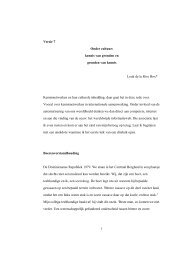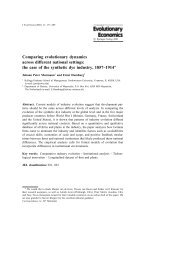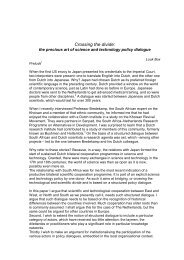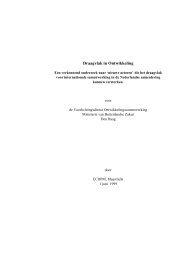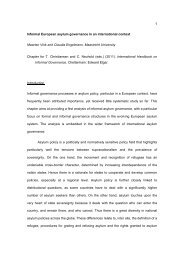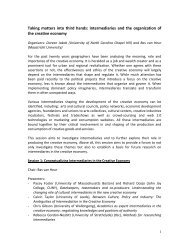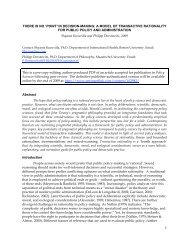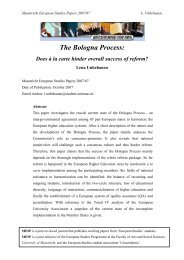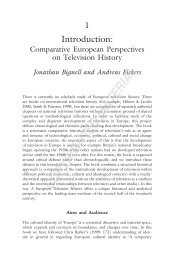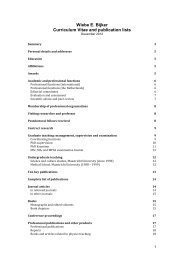Winds of Change: The Europeanization of National Foreign Policy
Winds of Change: The Europeanization of National Foreign Policy
Winds of Change: The Europeanization of National Foreign Policy
You also want an ePaper? Increase the reach of your titles
YUMPU automatically turns print PDFs into web optimized ePapers that Google loves.
Maastricht European Studies Papers 2007/01 Bennet Strang<br />
supposed that projection is more successfully exercised by larger states due to their<br />
comparatively extensive administrative capabilities, the validity <strong>of</strong> this suggestion can be<br />
doubted. Both domestic pressures and the level <strong>of</strong> commitment to EU policy development is<br />
more decisive (Wong, 2005). What can be said, however, is that the more complex and large<br />
Europe becomes the harder it gets for (rivalling) states to project their national foreign policy<br />
objectives (Maull, 2006).<br />
4.2.3 Elite Socialization<br />
“European socialisation not necessarily concerns the adoption <strong>of</strong> supranational role<br />
conceptions at the expense <strong>of</strong> intergovernmental conceptions or the mere shift <strong>of</strong> one category<br />
to another; it might also imply a re-definition or a re-conceptualisation <strong>of</strong> existing<br />
intergovernmental conceptions” 47 .<br />
While tracing national adaptation has already proven to be a difficult undertaking, even more<br />
so is uncovering evidence for this ‘re-conceptualization’, i.e. the repercussions <strong>of</strong> elite<br />
socialization (Manners/ Whitman, 2000). It is easier to enumerate the conditions for it to<br />
happen in the first place. Those are secrecy, a communication reflex, consensus and mutual<br />
respect for and acceptance <strong>of</strong> domaines privés (Osswald, 2005). Proposing this definition<br />
according to which<br />
“[s]ocialization…means the process by which actors internalize the norms which then<br />
influence how they see themselves and what they perceive as their [potentially<br />
changing national] interests” 48 ,<br />
the pivotal importance and centrality for the <strong>Europeanization</strong> <strong>of</strong> foreign policy becomes<br />
apparent. Assuming that the socialization <strong>of</strong> policy-makers into a European decision-making<br />
framework has an effect on their belief system 49 , the distinctive national orientation they have<br />
might be supplemented if not partly transformed by commonly accepted and legitimate 50<br />
European norms and social identities. Those transnational norms are subsequently adhered to,<br />
inter alia, in national day-to-day policy-making. This <strong>Europeanization</strong> <strong>of</strong> decision-makers 51<br />
47 (Beyers, 2002)<br />
48 (i Fanés, 2001)<br />
49 “<strong>The</strong> `belief system' <strong>of</strong> the practitioner is a deep-rooted legacy <strong>of</strong> experience and political culture,<br />
but it is also an organic set <strong>of</strong> attitudes which is capable, within limits, <strong>of</strong> self-transformation” (Hill<br />
quoted in Aggestam, 1999).<br />
50 Likewise, the increasing practice to take decisions in the EU arena is also considered to be<br />
legitimate, according to the so-called appropriateness logic (Smith, 2004).<br />
51 Some scholars suggest that larger member states experience a lower degree <strong>of</strong> elite socialization in<br />
the foreign policy domain, in contrast to smaller ones (Manners/ Whitman, 2000). However, despite<br />
the fact that “[e]ven for actors who are regularly involved in European policy-making, European<br />
experiences basically function as a secondary socialisation processes… [emphasis on original]”<br />
14



